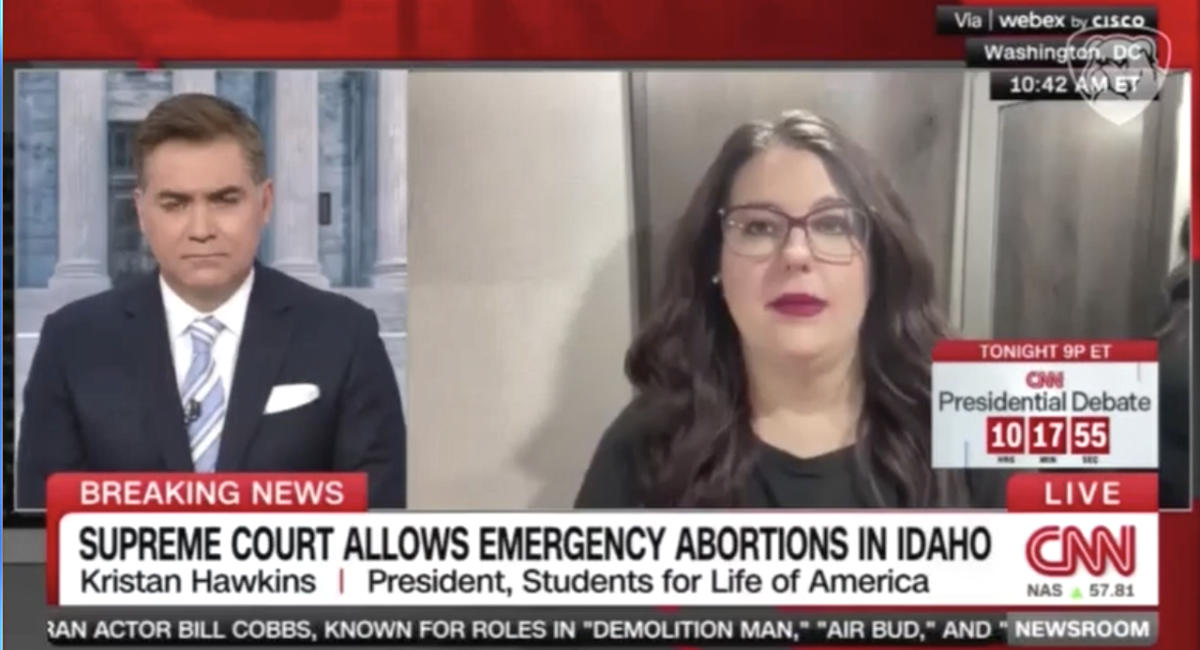Kristan Hawkins, president of Students for Life of America, was recently a guest on CNN Newsroom, where host Jim Acosta cut her mic when she began pointing out potential dangers associated with chemical abortions.
Acosta hosted Hawkins and Dr. Chris Pernell, Director of the NAACP Center for Health Equity, and the trio discussed the recent Supreme Court ruling on emergency room abortions, in which the justices decided to punt the decision back to a lower court.
“So what that means is that women’s health continues to be imperiled,” Pernell said. “It means that the federal law is in peril. And as long as that is true, the stats that we know that one in four Native American babies are born under these types of conditions where there is a lack of appropriate care. One in six Black babies are born under these conditions where there is a lack of appropriate care. The Supreme Court missed an opportunity. I agree with Justice Jackson. This was a moment for the Supreme Court to decide clearly and compellingly in the favor of the universal rights of all people, especially women. And that didn’t happen.”
Then, Hawkins was asked to respond — but Acosta didn’t like her response.
KRISTAN HAWKINS: Sure well, I think President Trump and the GOP needs to take notes, the Biden Administration continues to make the case to weaponize federal agencies, to make abortion a federal issue. But we also see a silver lining in this decision today. If Idaho, while this is tragic, saying Idaho must allow for abortions to prevent infertility, future infertility, the FDA must now change its policy too, to do the same, given their no-test online distribution scheme of chemical abortion pills, which we know harm women’s future fertility, as 15 percent of women of our population are Rh negative and there is no testing now because of the Biden Administration and their FDA, on these dangerous chemical abortion pills, she’s having these pill abortions—
ACOSTA: Is it mifepristone?
HAWKINS: She’s not being tested for Rh negativity—
ACOSTA: Haven’t the experts said that mifepristone is safe for women to use—
HAWKINS: — and she’ll no longer be able to carry to term.
ACOSTA: But, haven’t the experts said—
HAWKINS: Ask any woman who’s Rh negative, ask any woman, excuse me, as someone who’s been pregnant, sir, when you’re pregnant, one of the first things they do is, they test for Rh negative status because if you have a miscarriage, if you give birth, if you get an accident, if you get an abortion—
ACOSTA: No, Miss Hawkins—
HAWKINS: — You have to be treated immediately.
ACOSTA: I have to, I’m sorry, mifepristone has been proven to be safe. It’s been that way for years, but thank you for coming on. We appreciate it.
HAWKINS: It actually hasn’t. We know [microphone cut]
In an interview with Fox News Digital, Hawkins expanded on her point about the dangers of chemical abortions.
“I was shocked at how, as an invited guest, the male commentator wished to tell me the very real risks pregnant mothers face. As in every pregnancy, for the 15% of mothers who have Rh negative blood type, an exchange of blood by birth, by miscarriage, or by abortion can result in deadly antibodies that can leave a woman infertile without immediate care. Their fertility is at stake,” she said, adding (emphasis added):
Here is why that mattered: I was on CNN this morning, doing a reaction to the disappointing EMTALA case at the Supreme Court that had a silver lining for pro-life Americans. The Supreme Court said that protecting women’s fertility was an important part of their decision. If Idaho can be forced to do abortions in emergency rooms to prevent infertility, then the no-test, online distribution of chemical abortion pills as set up by the Biden-Harris administration can be stopped for the same reason – impact on fertility.
If you drop deadly chemical abortion pills into the mail, without proper screening [including for Rh factor] and follow-up care, women can be left infertile. And at the Supreme Court, infertility matters. Not that Jim [Acosta] has the bandwidth for that.
The no-test protocol for chemical abortions has risks for women, and this does include Rh factor; even Planned Parenthood has admitted it can be a risk in future pregnancies after a chemical abortion.
Ingrid Skop, an OB/GYN and vice president and director of medical affairs for Charlotte Lozier Institute, has explained the numerous risks associated with taking abortion pills, which does include Rh factor.
“Evaluation of Rh status and provision of Rhogam, if indicated, has long been the standard of care for early pregnancy loss, including elective induced abortion. This action will prevent a mother from mounting an immune response to her future unborn children. If Rhogam is not given and isoimmunization occurs, 14% of untreated infants will be stillborn and half will suffer neonatal death or brain injury,” she said, concluding, “It seems clear that unregulated chemical abortion is not compassionate care for women, but rather, a dangerous ‘chemical coat-hanger.’ Can’t we offer women in crisis a better option?”







